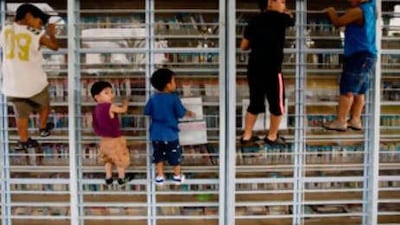TEL AVIV // The Israeli government's decision this week to deport hundreds of children of migrant workers, most of whom were born in Israel and have never been to their parents' native countries, has infuriated child advocates and spurred allegations that Israel is violating its international obligations.
The Israeli cabinet on Sunday approved a plan to expel 400 children of foreign workers in Israel, who now must leave by the end of the month. The government claimed the move was a bid to stem illegal immigration across Israel's porous southern border with Egypt and to safeguard the country's Jewish character. One Israeli advocacy group, the Hotline for Migrant Workers, estimated that as many as 700 of 1,200 school-age children are at risk of deportation.
Israel is home to about 200,000 migrant workers, mostly from the Philippines, China and Africa, half of whom have overstayed their visas. Hundreds of them are brought each year to Israel, where they work as cleaners, construction or farm workers or caregivers for the elderly. Under the plan, only children of parents who entered Israel legally may be eligible for permanent residency. They must be enrolled in school, speak Hebrew and have been either born in Israel or entered it before age 13. Also, they must have lived in Israel for five consecutive years, which means that children younger than five are likely to be expelled, as well as those who had returned for a period to their country of origin.
Critics said the government's move would harm children by sending many back to politically unstable and impoverished nations that their parents had left in hopes of a better life in Israel. These children would be paying the price for a continuing lack of a clear Israeli policy on dealing with foreign workers, they said. Yossi Sarid, a former Israeli education minister, lambasted the decision in a front-page column in the liberal newspaper Haaretz as "foolish and cruel."
"You don't expel children who were born and grew up here, who are about to enter kindergarten, who do not know any other country and any other language or any other friends," Mr Sarid wrote. Rotem Ilan, the head of the advocacy group Israeli Children, who was at the forefront of the battle against the expulsion, said, "We brought these people here to plough our fields, build our houses and take care of our grandparents. And with people, come families.".
Moriel Matalon, the chairman of the UN children's agency Unicef, said the children should not be the victims of an inadequate immigration policy. "The goal of the government to stop illegal immigration and protect Israel's Zionist character should not be achieved by deporting children but by limiting the inflow of additional worker immigrants," said Mr Matalon, who indicated that the Israeli decision is a violation of the 1991 UN Convention on Children's Rights, whose 198 signatories include Israel. The convention states that every child has the right upon birth to be registered in that country and be granted residency rights.
There were also voices of protest even within the predominantly right-wing ruling coalition. Benjamin Ben-Eliezer, the trade minister and a senior member of the centrist Labour party, reacted angrily, cautioning that Israel's image is likely to further deteriorate internationally as a result of the deportations. "A Jewish state that expels children is not the Jewish state that I know. This is not the right time for people to see the state of Israel chasing out 400 kids," he said.
Benjamin Netanyahu, the Israeli prime minister, on Sunday had defended the new policy as an effective tool to fight a growing wave of illegal immigration and was explicit about his concern for a growing non-Jewish population in the country. "On the one hand, this problem is a humanitarian problem. We all feel and understand the hearts of children. But on the other hand, there are Zionist considerations and ensuring the Jewish character of the state of Israel," Mr Netanyahu told his cabinet, which had debated the decision for almost a year. "We don't want to create an incentive for the inflow of hundreds of thousands of illegal migrant workers."
There appeared to be little chance that any appeal by the parents of those children due to be deported may succeed, mainly because the minister appointed to head the committee for so-called exceptions of the new policy was Eli Yishai, the interior minister and head of the ultra-Orthodox Shas party. Indeed, Mr Yishai has criticised the decision as not going far enough and said the remaining children should also leave the country. "Those who allow these children to stay in Israel are allowing the parents to pull one over on the state of Israel and stay in the country," he said.
vbekker@thenational.ae

